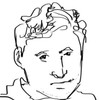[Via]One of the annual sideplots to the Pitchfork Music Festival is provided by Jim DeRogatis, a prominent Chicago music critic who in many ways views himself as the moral center of music journalism. In past years, he has critiqued Pitchfork’s booking of Odd Future (this was when debating the group was still fashionable and the group were not accepted as a cultural inevitability), and has spoken out publicly against the popularity of Chief Keef, who made a surprise appearance at last year’s fest.It should not go unnoticed that DeRogatis and R. Kelly have a complicated history together. In 2002, R. Kelly was charged with soliciting a minor for child pornography after a videotape, allegedly featuring he and an underage woman, was leaked to DeRogatis, who turned it over to the police. DeRogatis was later named as a witness in the 2008 trial of Kelly, where he dodged questioning from the judge, citing his Fifth Amendment rights to avoid incriminating himself.DeRogatis’s coverage of Pitchfork was tepid at its most generous, citing the twin gods of rock ‘n’ roll authenticity Kurt Cobain and Lester Bangs to support what he sees as the systematic subversion, homogenization, and commoditization of alternative music. In a sense, he is not incorrect. While they’re great for seeing as many bands as you are humanly capable of in a single weekend, music festivals are undoubtedly sexy to corporate sponsors, who see a field of thousands of young people watching Savages as a captive audience who can be advertised to. He takes particular umbrage at the presence of Kelly, claiming that by having R. Kelly headline their festival, Pitchfork is effectively selling out to the demonic specter of irony. DeRogatis’s assessment here, however, indicates a fundamental disconnect between the way he perceives music and the way we consume it today.In 2013, we are voracious consumers of music, schizophrenically pogoing between various styles with a rabid thirst for discovery. Music fans listen to R. Kelly with the same genuine enjoyment they listen to Wire, or Parquet Courts, or White Lung, or M.I.A. On the way to the festival, I tweeted a joke that Taylor Swift might one day headline Pitchfork. The more I think about it, it’s not out of the question. The specious barriers of “taste” are breaking down, and once they’ve been completely, blissfully eradicated, anything is possible.Pitchfork booking R. Kelly had more to do with iconography than irony, and that’s a good thing. R. Kelly is beloved in his hometown of Chicago, and playing the festival undeniably made sense for him, as working the summer festival circuit is quickly becoming more cost-effective for musicians who would otherwise be touring arenas. (Kelly also headlined Bonnaroo, and made an unannounced appearance at Coachella that made for one of the weekend's high-water marks.)One of the idiosyncratic forces driving this year's Pitchfork was that Day Three of its bill looked almost like a completely different festival than the one of the first two days. Where the first two days had leaned heavily upon guitar-based music Pitchfork Day Three was much more focused on hip-hop and electronic music. Besides R. Kelly, Day Three also featured TNGHT, M.I.A., Lil B, Killer Mike and El-P. More importantly, Day Three showcased performances by local juke hero DJ Rashad and Chicago rapper Tree, who used his set to help establish himself as an undeniable rising force in hip-hop. By booking two great local acts along with Kelly and allowing for the purchase of single-day tickets, Pitchfork made a gesture of loyalty to its hometown of Chicago, effectively saying that in a music industry that tends to position festivals as "destination events," Pitchfork still wanted to hold a festival the local casual music fan would still be interested in. That's as rare as a blessing from the Based God himself.R. Kelly’s life’s work is to bring joy to people. He strives to entertain, and entertain us he did. It was a rare moment when Kelly—wielding a diamond-studded microphone like it was a scimitar of truth and wearing a shirt that was also prominently diamond-accented—was not grinning ear-to-ear as he stormed through 38 songs, including two wonderful and absurd freestyles. It’s a rare privilege of watching an entire field of strangers singing and dancing as one. It speaks to live music’s capacity to serve as a uniting force, its ability to let a person be a part of something much bigger than themselves. Watching Kelly have the crowd eating out of the palm of his hand, it was clear that R. Kelly understands the unique position that life has placed him in, and absolutely relishes it. Watching someone as singular as R. Kelly self-actualize was beyond rewarding.As a final parting shot, Kelly performed “I Believe I Can Fly” with a full church choir, at the end of the song releasing a multitude of balloons meant to look like doves. Just as many others at the festival, I grew up with that song. “I Believe I Can Fly” is an indelible part of my musical lexicon, a song that triggers so many memories of my childhood that I couldn’t help be emotionally overwhelmed by seeing it live. Though launching an army of fake doves might be laughable, it provides the exact same sense of overwhelming ecstasy as one might get from seeing Björk playing “All Is Full of Love,” or Belle and Sebastian performing “Get Me Away from Here I’m Dying.” Each are songs that resonate intensely with our generation, and are part of the new canon of popular music, just as bands like Black Flag, Bad Brains, and the Replacements were for the generation that came before us. It’s not that R. Kelly was playing Pitchfork because everyone thought it would be funny—far from it. He was playing because his music matters to people, and if Jim DeRogatis wasn’t paying attention to that, that’s his problem, not Pitchfork’s, and it’s certainly not ours.Drew Millard is an Assistant Editor at Noisey. He's on Twitter - @drewmillard
Advertisement
Advertisement
